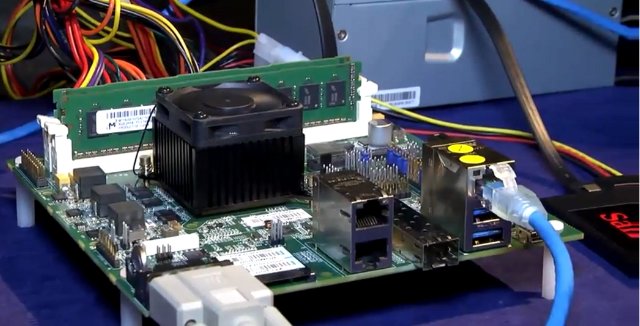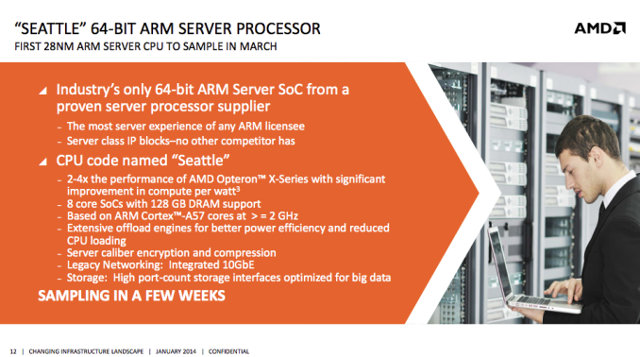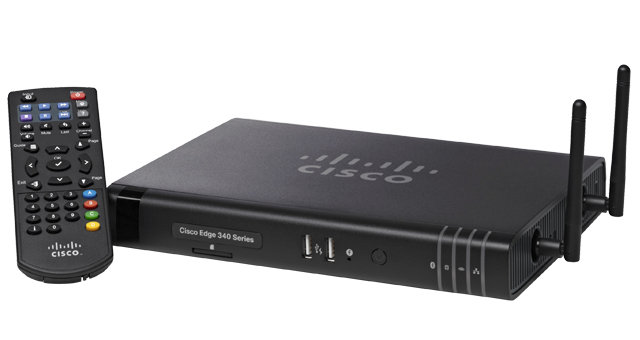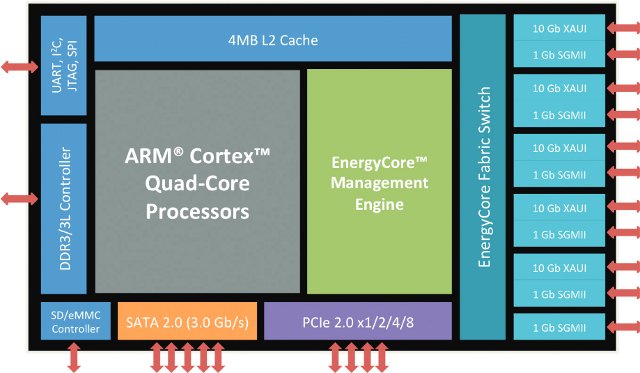Linaro Connect Asia 2014 has just started in Macau today and will take place until Friday. You can follow the sessions live and/or their recordings via Linaro OnAir YouTube Channel. I’ve watched the opening keynote, and embedded the video at the bottom of this post. The keynote focuses on ARMv8 for Linux and Android on servers, mobile devices, digital home, and more, and involves two main speakers: George Grey, Linaro CEO , and Jon Masters, Chief ARM Architecture at Red Hat. The speaker beginning of the video provides some practical information and the schedule for Linaro Connect. The keynote itself really starts around 15:50 with George Grey who spends the first 10 minutes introducing the latest Linaro members: Qualcomm, Mediatek, ZTE, AllWinner and Comcast. He then talks about the new Mobile sub-committee (MOBSCOM) that will focus on big.LITTLE, Android optimization and Android on ARMv8, as well as the soon-to-be-announced Linaro […]
Applied Micro X-Gene X-C1 ARMv8 Server Development Board is Now Available for Pre-order
Applied Micro X-Gene is the very first processor to use ARM 64-bit architecture (ARMv8), not Cortex A53 or Cortex A57, but a custom implementation, and last year we’ve seen the company’s ARMv8 development board running 4 Linux virtual machines via KVM. The platform, called X-Gene X-C1, can now be pre-ordered to develop private cloud, public cloud, and enterprise applications. There’s limited public information for now, but I could derive specifications from a few places on the web and available pictures: SoC – Applied Micro X-Gene eight core ARMv8 processor @ 2+GHz System Memory – 2x DDR3 memory slots Storage – 4x SATA 2/3 ports + SD card slot Connectivity – 3x 10 Gb Ethernet ports USB – 2x SuperSpeed USB 3.0 ports, 1x mini USB port Expansion – PCIe Gen 3 Monitoring DB9 Serial port Power – ATX I don’t know what’s the metallic connector with holes between the two […]
AMD Opteron A1100 Server SoCs Feature 4 to 8 ARM Cortex A57 Cores
A few months ago, AMD published a roadmap showing AMD “Seattle” Server CPUs based on ARMv8 64-bit architecture were planned for H2 Q2014. The company has now announced the first series of processors that will be based on ARM Cortex A57: AMD Opteron A1100 Series, as well as the corresponding development platform at the Open Compute Project Summit in San Jose, California. Key features of AMD Opteron A1100 Series processors: 4 or 8 core ARM Corte-A57 processors Up to 4 MB of shared L2 and 8 MB of shared L3 cache Configurable dual DDR3 or DDR4 memory channels with ECC at up to 1866 MT/second Up to 4 SODIMM, UDIMM or RDIMMs 8x lanes of PCI-Express Gen 3 I/O 8x Serial ATA 3 ports 2x 10 Gigabit Ethernet ports ARM TrustZone technology for enhanced security Crypto and data compression co-processors On the software side, the company mentionned it is a […]
Cisco Edge 340 Digital Media Player Targets Digital Signage & Business Applications
Most of the time I feature low cost (Chinese) media players in this blog, but today I’ve had a look at a media player at the other side of the market that targets business users with applications such as webcasting and video sharing, digital signage, and business IPTV. Cisco Edge 340 digital media player (DMP) comes in two flavors “Wireless” and “non-wireless”, and boast features such as PoE or RS-232 which are not often found in consumer devices. Cisco Edge 340 Specifications: SoC – Dual 1.60 GHz processor with integrated GPU @ 400MHz, most probably Intel Atom Z2560. It turns out it could be Intel Atom CE5335 instead. System Memory – 2GB DDR3 @ 800 MHz Storage – 32GB SSD (70MB/s write speed) and SD card slot Connectivity – 1x Ethernet 10/100/1000-Gbps port with PoE and PoE+ support. Wireless version only: Dual band Wi-Fi 802.11 b/g/n + Bluetooth 4.0 Video […]
Fedora 20 “Heisenbug” Release Makes ARM a Primary Architecture
Fedora has been supporting ARM architecture for a while now, but it was only as a secondary architecture without official support. With the recent Fedora 20 release, nicknamed “Heisenbug”, the ARM architecture, more exactly ARMv7 hard float and greater, is promoted to a primary architecture meaning ARMv7 will have the same status as x86 and x86_64 architectures with packages officially build and supported by the Fedora community. What it does not mean however, due to the nature of ARM architecture, is that you can simply download an ISO to install on any ARM platforms, like you would do on an Intel or AMD computer. It’s a little more complicated than that, as it is platform specific, but instructions are available for the Beaglebone Black, Compulab Trimslice, the Wandboard, Calxeda Energycore Midway and Highbank, and Versatile Express in QEMU. You can download images with MATE, KDE, XFCE, LXDE, SOAS desktops, as […]
ARM Based Servers and Servers-on-a-Chip (SoCs) at ARM Techcon 2013
ARM Techcon 2013 took place on October 29 – 31, 2013, in Santa Clara, and several companies announced servers, or chips for server based on ARM technology. None of those are for home used, but for now ARM based servers target enterprise and cloud data. Yet end users may them indirectly when they access social networks such as Facebook, or other online services such as Paypal. Calxeda ECX-2000 SoC After their ECX-1000 quad core Cortex A9 Server-on-chip, Calxeda has announced ECX-2000 SoC featuring four Cortex A15 cores. The new SoC provides about twice the performance, 3 times the memory bandwidth, and 4 times the memory capacity (up to 16GB RAM) of the earlier chip. One of the key advantage of Cortex A15 over Cortex A9 is hardware virtualization that allows support for KVM and Xen hypervisors. ECX-2000 is supported in Canonical Ubuntu Linux 13.10 and can run Havana Openstack. Other […]
Fedora 19 ARM Remix R1 Release With Support for AllWinner A10, A10s, A13 and A20 SoCs
After releasing a stable version of Fedora 18 for AllWinner A10 and A13 in February, Hans de Goede, working at Red Hat and a Fedora contributor, has recently announced “Fedora 19 ARM remix for Allwinner SOCs” on linux-sunxi community mailing list. This released based on Fedora 19 for ARM together with linux-sunxi kernel and u-boot, adds support for A10s and A20 based devices, and 38 boards and devices are now supported. To give it a try, download the 665MB image:
|
1 |
wget http://scotland.proximity.on.ca/contrib-images/hansg/Fedora-19-a10-armhfp-r1.img.xz |
then write it to an SD card (8GB or greater):
|
1 2 |
xzcat Fedora-19-a10-armhfp-r1.img.xz > /dev/[device] sync |
Where you have to replace [device] with your actual SD card device, e.g. sdc.Since u-boot is board/product specific, you’ll also have to update u-boot for your hardware. Remove the SD card, re-insert it, and run:<
|
1 |
sh <uboot-part-mount>/select-board.sh |
to display a graphical menu (if dialog is installed on your Linux PC), or a list supported boards and products:
|
1 2 3 4 5 6 7 8 9 10 11 12 13 14 15 16 17 18 19 20 21 22 23 24 25 26 27 28 29 30 31 32 33 34 35 36 37 38 39 |
Available boards: a10_mid_1gb A10 tablet sold under various names (whitelabel) a13_mid A13 tablet sold under various names (whitelabel) a10s-olinuxino-m A10s-OLinuXino-MICRO (Olimex) a13-olinuxino A13-OLinuXino (Olimex) a13-olinuxinom A13-OLinuXino-MICRO (Olimex) a20-olinuxino_micro A20-OLinuXino-MICRO (Olimex) auxtek-t003 Auxtek T003 hdmi tv stick auxtek-t004 Auxtek T004 hdmi tv stick ba10_tv_box BA10 TV Box coby_mid7042 Coby MID7042 tablet coby_mid8042 Coby MID8042 tablet coby_mid9742 Coby MID9742 tablet cubieboard_512 Cubieboard development board 512 MB RAM cubieboard Cubieboard development board 1024 MB RAM cubieboard2 Cubieboard 2 (A20) development board dns_m82 DNS AirTab M82 tablet EOMA68-A10 EOMA68 A10 CPU card gooseberry_a721 Gooseberry development board h6 H6 netbook hackberry Hackberry development board hyundai_a7hd Hyundai a7hd tablet inet97f-ii iNet-97F Rev.2 (and clones) tablet mele_a1000 Mele a1000/a2000 512 MB RAM mele_a1000g Mele a1000g/a2000g 1024 MB RAM mele_a3700 Mele a3700 (a1000g without sata) mini-x Mini-X 512 MB RAM mini-x-1gb Mini-X 1024 MB RAM mk802 mk802 (with female mini hdmi) 512 MB RAM mk802-1gb mk802 (with female mini hdmi) 1024 MB RAM mk802_a10s mk802 with A10s (s with a circle around it on the barcode label mk802ii mk802ii (with male normal hdmi) 1024 MB RAM pcduino pcDuino development board pov_protab2_ips9 Point of View ProTab 2 IPS 9" tablet pov_protab2_ips_3g Point of View ProTab 2 IPS tablet with 3g r7-tv-dongle r7 hdmi tv stick uhost_u1a UHost U1A hdmi tv stick wobo-i5 Wobo i5 TV Box xzpad700 XZPAD700 7" tablet |
Select […]
Linaro Connect Europe 2013 Sessions and Mini-Summit
Linaro Connect Europe 2013 (LCE13) is taking place in Dublin, Ireland on July 8 – 12, 2013. If you are not there, you can still follow the event remotely as the event schedule is available with tracks focused on Android, Builds and Baselines, Enterprise, Graphics and Multimedia, Linux Kernel, Network, Project Management Tools and Training, and the Testing and Validation mini-summit will also take place at the same time. There will be hacking and lab sessions each day (except on Friday) where you can expect to learn useful skills. I’ve selected 2 sessions per day that I think might be particularly interesting. Monday 10:00 – 10:45 – ARMv8 Status and Updates Current Status of v8 tree What’s merged? What’s features are next priorities? Platform Updates What members should know about adding new v8 platforms 12:00 – 13:00 – How to make Android more efficient for entry level products The main objective of […]









